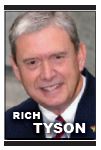Richard Tyson
Since my earliest childhood days, I have been fascinated by the outstanding men and women of history, especially those we esteem as great leaders. I have been mesmerized by the stories of George Washington, Abraham Lincoln, Winston Churchill, Benjamin Franklin, Mother Teresa and Florence Nightingale, as well as a host of military and religious leaders — and more captains of industry than I can count.
These stories, as well as my reading of the outstanding book Impact Players by Liz Wiseman, have led me to compile a list of some of their common traits — those attributes that correlate to their exceptional lives and leadership.
1. They are committed to learning as a life-long continuous process. They learn through observation of the current affairs of their days and times, through study of history and the processes and content relevant to their situation and through their engagement with others. They are curious and open to new ideas and viewpoints.
2. They are focused on a cause. They have a deep sense of personal purpose which drives them to engage their minds, hearts and actions in its pursuit.
3. They are self-disciplined. They recognize that to have a positive impact on their cause, they must dedicate themselves to the preparation and work it entails. The time clock, therefore, does not govern their actions and behavior. Rather, by developing personal processes of intellectual, physical, spiritual and social activities, they prepare themselves for service. Each day represents a new opportunity for growth and development in serving their cause.
4. They practice the art of delayed gratification. They are patient. They recognize the need for short-term progress, but they also recognize that significant impact most often comes from tenaciously playing “the long game.” They realize that great causes often take longer than anticipated.
5. They look beyond themselves, defining their value through the eyes of those they serve. They zero in on the job that their constituencies have hired them for; they seek to help in meeting their needs and solving their problems. They capably discern and respond to unmet needs. They have a heartfelt desire to make things better.
6. They have a strong sense of agency. While they are open to the ideas and direction of others, they are comfortable acting independently. And when there are unclear roles, they willingly step up and lead.
7. They do not shrink from ambiguity. They tend to see challenges as opportunities. They are undeterred by adversity. They are willing to “be at risk.” They are not always unafraid, but they have the courage to step into the dark.
8. They readily admit their mistakes. While exhibiting a high degree of personal confidence, they are humble. They recognize their own limits and weaknesses, and therefore welcome feedback and contrary viewpoints.
9. They stick with things until the job is done. They exhibit grit and tenacity in working to completion. These traits are manifested in both their daily planning and activities as well as their resolve to stay the course over the long haul.
10. They are generally quite optimistic. Even in the face of grim circumstances, they tend to be upbeat and good-humored. They are resilient in the face of setbacks. They work with enthusiasm, energy and passion.
11. They naturally and regularly express gratitude to others. They acknowledge the contributions of those who help them achieve their purpose and goals. They maintain valuable connections and relationships.
12. They are kind, even when it’s inconvenient. Leadership is often a heady experience. It is easy to get caught up in the emotions of driving toward a great purpose and forget your humanity — and the humanity of others. That said, there is rarely an occasion when kindness toward others isn’t the right attitude in governing our actions. And kindness should not be reserved for only those who help us along the way; it should be extended to everyone.
In this day and age when we seem to be deeply challenged in finding strong leaders, we might all consider how we can encourage and adopt the personal attributes of the great leaders of the past.
Richard Tyson is the founder, principal owner and president of CEObuilder, which provides forums for consulting and coaching to executives in small businesses.








